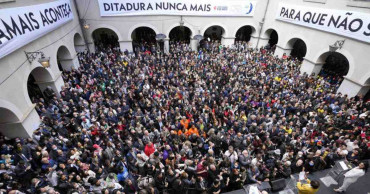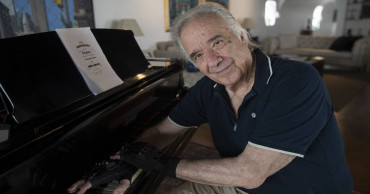Sao Paulo
'No amnesty!': Brazilian protests demand jail for rioters
“No amnesty! No amnesty! No amnesty!”
The chant reverberated off the walls of the jam-packed hall at the University of Sao Paulo’s law college on Monday afternoon. Within hours, it was the rallying cry for thousands of Brazilians who streamed into the streets of Rio de Janeiro and Sao Paulo, penned on protest posters and banners.
The words are a demand for retribution against the supporters of former President Jair Bolsonaro who stormed Brazil’s capital Sunday, and those who enabled the rampage.
“These people need to be punished, the people who ordered it need to be punished, those who gave money for it need to be punished,” Bety Amin, a 61-year-old therapist, said on Sao Paulo’s main boulevard. The word “DEMOCRACY” stretched across the back of her shirt. “They don’t represent Brazil. We represent Brazil.”
Protesters' push for accountability evokes memories of an amnesty law that for decades has protected military members accused of abuse and murder during the country's 1964-85 dictatorship. A 2014 truth commission report sparked debate over how Brazil has grappled with the regime's legacy.
Declining to mete out punishment “can avoid tensions at the moment, but perpetuates instability,” Luis Felipe Miguel, a professor of political science at the University of Brasilia, wrote in a column entitled “No Amnesty” published Monday evening. “That is the lesson we should have learned from the end of the military dictatorship, when Brazil opted not to punish the regime’s killers and torturers.”
Brazilian police on Monday had already rounded up roughly 1,500 rioters. Some were caught in the act of trashing Brazil's Congress, the Supreme Court and the presidential palace. Most were detained the following morning at an encampment in Brasilia. Many were held in a gymnasium throughout the day, and video shared on pro-Bolsonaro social media channels showed some complaining about poor treatment in the crowded space.
Hundreds of elderly and sick detainees were released Tuesday after they were questioned and had their phones inspected, local media O Globo reported. The Federal Police’s press office told The Associated Press that the force plans to indict at least 1,000 people. As of early afternoon, 447 people had been transfered to either a detention center or prison, according to a bulletin from the federal district’s penitenciary administration.
The administration of President Luiz Inácio Lula da Silva says jailing the rioters is only the start.
Justice minister Flávio Dino vowed to prosecute those who acted behind the scenes to summon supporters on social media and finance their transport on charges involving organized crime, staging a coup, and violent abolition of the democratic rule of law. Authorities also are investigating allegations that local security personnel allowed the destruction to proceed unabated.
“We cannot and will not compromise in fulfilling our legal duties," Dino said. "This fulfillment is essential so such events do not repeat themselves.”
Lula signed a decree, now approved by both houses of Congress, ordering the federal government to assume control of security in the capital.
Read more: Brazil election: Lula defeats Bolsonaro to become president again
Far-right elements have refused to accept Bolsonaro’s electoral defeat. Since his Oct. 30 loss, they have camped outside military barracks in Brasilia, pleading for intervention to allow Bolsonaro to remain in power and oust Lula. When no coup materialized, they rose up themselves.
Decked out in the green and yellow of the national flag, they broke windows, toppled furniture and hurled computers and printers to the ground. They punched holes in a massive Emiliano Di Cavalcanti painting at the presidential palace and destroyed other works of art. They overturned the U-shaped table where Supreme Court justices convene, ripped a door off one justice’s office and vandalized a statue outside the court. Hours passed before police expelled the mob.
"It's unacceptable what happened yesterday. It's terrorism," Marcelo Menezes, a 59-year-old police officer from northeastern Pernambuco state, said at a protest in Sao Paulo. “I’m here in defense of democracy, I’m here in defense of the people.”
Cries of “No amnesty!" were also heard during Lula's Jan. 1 inaugural address, in response to the president detailing the neglect of the outgoing Bolsonaro administration.
Bolsonaro, a former army captain, has waxed nostalgic for the dictatorship era, praised a notorious torturer as a hero and said the regime should have gone further in executing communists. His government also commemorated the anniversary of Brazil’s 1964 coup.
Political analysts had repeatedly warned that Bolsonaro was laying the groundwork for an insurrection in the mold of that which unfolded in the U.S. Capitol on Jan. 6, 2021. For months, he stoked belief among hardcore supporters that the nation’s electronic voting system was prone to fraud — though he never presented any evidence and independent experts disagreed.
Results from the election, the closest since Brazil's return to democracy, were quickly recognized by politicians across the spectrum, including some Bolsonaro allies, as well as dozens of other governments. The outgoing president surprised nearly everyone by promptly fading from view, neither conceding defeat nor emphatically crying fraud. He and his party submitted a request to nullify millions of votes, which was swiftly dismissed by the electoral authority.
None of that dissuaded his die-hard backers from their conviction that Bolsonaro should still be in power.
In the immediate aftermath of the riot, Lula said that the so-called “fascist fanatics” and their financial backers must be held responsible. He also accused Bolsonaro of encouraging the uprising.
Bolsonaro denied the president’s accusation Sunday. Writing on Twitter, he said peaceful protest is part of democracy, but vandalism and invasion of public buildings cross the line.
Read more: Brazil election body rejects Bolsonaro's push to void votes
Authorities are also investigating the role of the federal district's police in either failing to halt protesters' advance or standing aside to let them run amok. Prosecutors in the capital said local security forces were negligent at the very least. A supreme court justice temporarily suspended the regional governor, who oversees the force, for what he termed "willful omission". Another justice blamed authorities across Brazil for not swiftly cracking down on “homegrown neofascism.”
The upheaval finally prompted municipal and state governments to disperse the pro-Bolsonaro encampments outside the military barracks. Their tents and tarps were taken down, and residents were sent packing.
Meanwhile, pro-democracy protesters want to ensure their message — “No amnesty!” — will be heeded by both the law enforcement authorities and any far-right elements who might dare defy democracy again.
“After what happened yesterday, we need to go to the street,” said Marcos Gama, a retiree protesting Monday night in Sao Paulo. “We need to react.”
3 years ago
Brazilians mourn Pelé at the stadium where he got his start
Thousands of mourners, including high school students and supreme court justices, began filing past the body of Pelé on Monday on the century-old field where he made his hometown team one of Brazil’s best.
The soccer great died on Thursday after a battle with cancer. He was the only player ever to win three World Cups, and he was 82.
Pelé’s coffin, draped in the flags of Brazil and the Santos FC football club, was placed on the midfield area of Vila Belmiro, the stadium outside Sao Paulo that was his home for most of his career. A Catholic Mass will be celebrated there Tuesday morning before his burial at a nearby cemetery. Brazil’s newly inaugurated President Luiz Inácio Lula da Silva will come to Vila Belmiro shortly before Pelé’s coffin is removed from the stadium.
The storied 16,000-seat stadium was surrounded by mourners, and covered with Pelé-themed decorations. Fans coming out of the stadium said they’d waited three hours in line, standing under a blazing sun.
Read: 'Greatest of all time': Pelé as described by his peers
Forty-five years after Pelé played his last game, he’s still a central part of Brazil’s national story.
Geovana Sarmento, 17, came with her father, who was wearing a Brazil shirt with Pelé’s name.
“I am not a Santos fan, neither is my father. But this guy invented Brazil’s national team. He made Santos stronger, he made it big, how could you not respect him? He is one of the greatest people ever, we needed to honor him,” she said.
In the 1960s and 70s, Pelé was perhaps the world’s most famous athlete. He met presidents and queens, and in Nigeria a civil war was put on hold to watch him play. Many Brazilians credit him with putting the country on the world stage.
Read: Pelé remembered for transcending football around world
Caio Zalke, 35, an engineer, also wore a Brazil shirt as he waited in line. “Pelé is the most important Brazilian of all time. He made soccer important for Brazil and he made Brazil important for the world,” he said.
Rows of shirts with Pelé’s number 10 were placed behind one of the goals, waving in the city’s summer winds. A section of the stands was filling up with bouquets of flowers placed by mourners and sent by clubs and star players — Neymar and Ronaldo among them — from around the world as loudspeakers played a song named “Eu sou Pelé” (“I am Pelé”) that was recorded by the Brazilian himself.
Claudio Carrança, 32, a salesman, said: “I never saw him play, but loving Pelé is a tradition that goes from father to son in Santos. I learned his history, saw his goals, and I see how Santos FC is important because he is important. I know some Santos fans have children supporting other teams. But that’s just because they never saw Pelé in action. If they had, they would feel this gratitude I feel now.”
Santos FC said that more than 1,100 journalists from 23 countries were at the funeral. Dignitaries and friends of Pelé in attendance spoke at the funeral.
Read More: Brazil mourns Pelé, who made every part of the country proud
Among them was Pelé’s best friend Manoel Maria, who is also a former Santos player. “If I had all the wealth in the world I would never be able to repay what this man did for me and my family. He was as great a man as he was as a player; the best of all time. His legacy will outlive us all. And that can be seen in this long line with people of all ages here.”
FIFA President Gianni Infantino told journalists that every country should name a stadium after Pelé.
“I am here with a lot of emotion, sadness, but also with a smile because he gave us so many smiles,” Infantino said. “As FIFA, we will pay a tribute to the ‘King’ and we ask the whole world to observe a minute of silence.”
Another fan and friend in line was Brazilian Supreme Court Justice Gilmar Mendes.
Read More: 'Greatest of all time': Pelé as described by his peers
“It is a very sad moment, but we are now seeing the real meaning of this legendary player to our country,” Mendes told journalists. “My office has shirts signed by Pelé, a picture of him as a goalkeeper, also signed by him. DVDs, photos, a big collection of him.”
Mendes also said Pelé was a humble man despite his global fame, and that he deserves every tribute.
The casket will be ushered through the streets of Santos before his burial Tuesday.
Pelé had undergone treatment for colon cancer since 2021. The medical center where he had been hospitalized said he died of multiple organ failure as a result of the cancer.
The soccer star led Brazil to World Cup titles in 1958, 1962 and 1970, and remains one of the team’s all-time leading scorers with 77 goals. Neymar tied Pelé’s record during this year’s World Cup in Qatar.
Read More: As 'The King,' Pelé enchanted fans and dazzled opponents
3 years ago
As 'The King,' Pelé enchanted fans and dazzled opponents
Pelé was simply “The King.” He embraced “the beautiful game” of soccer in his 1958 World Cup debut for Brazil and never really let go.
He won a record three World Cups and was widely regarded as one of his sport's greatest players. His majestic and galvanizing presence set him among the most recognizable figures in the world.
Pelé died Thursday at 82. He had undergone treatment for colon cancer since 2021.
Pelé was among the game’s most prolific scorers and spent nearly two decades enchanting fans and dazzling opponents. His grace, athleticism and moves on soccer’s highest stage transfixed all. He orchestrated a fast, fluid style of play that revolutionized the sport — a flair that personified Brazilian elegance on the field.
He carried his country to soccer’s heights and became a global ambassador for his sport in a journey that began on the streets of Sao Paulo state, where he would kick a sock stuffed with newspapers or rags.
“Pelé changed everything. He transformed football into art, entertainment,” Neymar, a fellow Brazilian soccer player, said on Instagram. “Football and Brazil elevated their standing thanks to the King! He is gone, but his magic will endure. Pelé is eternal!”
Read more: Pelé, Brazil’s mighty king of ‘beautiful game,’ has died
In the conversation about soccer’s greatest player, only the late Diego Maradona, Lionel Messi and Cristiano Ronaldo are mentioned alongside him.
Different sources, counting different sets of games, list Pelé’s goal totals anywhere between 650 (league matches) to 1,281 (all senior matches, some against low-level competition). When Maradona once interviewed Pelé, he playfully asked the Brazilian how he accumulated so many goals.
The player who would be dubbed “The King” was introduced to the world at 17 at the 1958 World Cup in Sweden, the youngest player ever at the tournament.
Pelé was the emblem of his country’s World Cup triumph of 1970 in Mexico. He scored in the final and set up Carlos Alberto with a nonchalant pass for the last goal in a 4-1 victory over Italy.
The image of Pelé in a bright-yellow Brazil jersey, with the No. 10 stamped on the back, remains alive with soccer fans everywhere. As does his trademark goal celebration — a leap with a right fist thrust high above his head.
Pelé’s fame was such that in 1967 factions of a civil war in Nigeria agreed to a brief cease-fire so he could play an exhibition match in the country. He was knighted by Britain’s Queen Elizabeth II in 1997. When Pelé visited Washington to help popularize the game in North America, it was the U.S. president who stuck out his hand first.
"You don’t need to introduce yourself because everyone knows who Pelé is,” Ronald Reagan said.
Pelé was Brazil’s first modern Black national hero but rarely spoke about racism in a country where the rich and powerful tend to hail from the white minority.
Opposing fans taunted Pelé with monkey chants at home and all over the world.
“He said that he would never play if he had to stop every time he heard those chants," said Angelica Basthi, one of Pelé’s biographers. "He is key for Black people’s pride in Brazil, but never wanted to be a flagbearer.”
Pelé’s life after soccer took many forms. He was a politician — Brazil’s Extraordinary Minister for Sport — a wealthy businessman, and an ambassador for UNESCO and the United Nations.
He had roles in movies, soap operas and even composed songs and recorded CDs of popular Brazilian music.
Pelé was an ambassador for his sport until his final years but as his health deteriorated his travels and appearances became less frequent. After needing a hip replacement, he started using a cane.
Read more: Pelé’s family gathers at hospital in Sao Paulo
He was often seen in a wheelchair during his final years and did not attend a ceremony to unveil a statue of him representing Brazil’s 1970 World Cup team.
“He gets very shy, he gets very embarrassed," his son Edinho told Globoesporte.com. "He doesn’t want to go out.”
Pelé spent his 80th birthday with a few relatives.
Pelé spent a month hospitalized in 2021 after surgery to remove a tumor from his colon. Pelé said he was ready “to play 90 minutes, plus extra time,” but soon started chemotherapy.
Born Edson Arantes do Nascimento, in the small city of Tres Coracoes in the interior of Minas Gerais state on Oct. 23, 1940, Pelé grew up shining shoes to buy his modest soccer gear. His father was also a player.
Pelé’s talent drew notice when he was 11, and a local professional player brought him to Santos’ youth squads. Despite his youth and 5-foot-8 frame Pelé’ scored against grown men with the same ease he displayed against friends back home. He debuted with the Brazilian club at 15 in 1956, and the club quickly gained worldwide recognition.
The name Pelé came from him mispronouncing the name of a player called Bilé. He later became known simply as ‘O Rei’ – The King.
Pelé went to the 1958 World Cup as a reserve but became a key part for his country’s championship team. His first goal, in which he flicked the ball over the head of a defender and raced around him to volley it home, was voted as one of the best in World Cup history.
“When Pelé scored,” veteran Swedish midfielder Sigge Parling said, “I have to be honest and say I felt like applauding.”
The 1966 World Cup in England — won by the hosts — was a bitter one for Pelé, by then already considered the world’s top player. Brazil was knocked out at the group stage and Pelé, angry at fouls and hard tackles by Portugal, swore it was his last World Cup.
He changed his mind and was rejuvenated in the 1970 World Cup. In a game against England, he struck a header for a certain score, but the great goalkeeper Gordon Banks flipped the ball over the bar in an astonishing move. Pelé likened the save — one of the best in World Cup history — to a “salmon climbing up a waterfall.” Later, he scored the opening goal in the final against Italy, his last World Cup match.
Read more: Image of Pelé shines bright for Brazilian fans at World Cup
In all, Pelé played 114 matches with Brazil, scoring a record 95 goals — including 77 in official matches. Most of his goals came with Santos, which he led to five national titles, two Copa Libertadores trophies and two club world championships — all in the 1960s.
His run with Santos stretched over three decades until he went into semi-retirement after the 1972 season. Wealthy European clubs tried to sign him, but the Brazilian government intervened to keep him from being sold, declaring him a national treasure.
On the field, Pelé’s energy, vision and imagination drove a gifted Brazilian national team, with intricate passing combinations slicing defenses while leaving room for players to showcase flashy skills.
The fast, fluid style of play exemplified “O Jogo Bonito” — Portuguese for “The Beautiful Game.” And at the center of it all, like a maestro in command of his orchestra, was Pelé. It was his 1977 autobiography, “My Life and the Beautiful Game,” that made the phrase part of soccer’s lexicon.
In 1975, he joined the New York Cosmos of the North American Soccer League. Although he was past his prime at 34 years old, Pelé briefly gave soccer a higher profile in North America before ending his career on Oct. 1, 1977, in an exhibition between the Cosmos and Santos. Among the dignitaries on hand was perhaps the only other athlete whose renown spanned the globe — Muhammad Ali.
Pelé had two daughters out of wedlock and five children from his first two marriages, to Rosemeri dos Reis Cholbi and Assiria Seixas Lemos. He later married businesswoman Marcia Cibele Aoki.
3 years ago
Brazilians rally for democracy, seek to rein in Bolsonaro
Thousands of Brazilians flocked to a law school Thursday in defense of the nation’s democratic institutions, an event that carried echoes of a gathering nearly 45 years ago when citizens joined together at the same site to denounce a brutal military dictatorship.
In 1977, the masses poured into the University of Sao Paulo’s law school to listen to a reading of “A Letter to Brazilians,” a manifesto calling for a prompt return of the rule of law. On Thursday, they heard declarations defending democracy and the country’s elections systems, which President Jair Bolsonaro has repeatedly attacked ahead of his reelection bid.
While the current manifestos don’t specifically name Bolsonaro, they underscore the country’s widespread concern that the far-right leader may follow in former U.S. President Donald Trump’s footsteps and reject election results not in his favor in an attempt to cling to power.
“We are at risk of a coup, so civil society must stand up and fight against that to guarantee democracy,” José Carlos Dias, a former justice minister who helped write the 1977 letter and the two documents read Thursday, told The Associated Press.
In Sao Paulo, drivers stuck in traffic on one of the main roads to the law school applauded and honked as marching students chanted pro-democracy slogans. A huge inflatable electronic voting machine by the building’s main entrance bore the slogan “RESPECT THE VOTE”.
Read: Brazil confirms first monkeypox-related death
Inside, hundreds of guests gathered in the university’s Great Hall to hear speeches, while others stood outside watching on big flat screens.
The proclamations are contained in two letters. The first went online on July 26 and has been signed by nearly 1 million citizens, including ordinary people; popular musicians such as Caetano Veloso and Anitta; high-profile bankers and executives; and presidential candidates, among them former President Luiz Inácio Lula da Silva, who leads all polls ahead of the October election.
The second letter, published in newspapers last Friday, carries the endorsement of hundreds of companies in banking, oil, construction and transportation — sectors that traditionally have been averse to taking public political stances, said Carlos Melo, a political science professor at Insper University in Sao Paulo. They appear to have made an exception now, given the fear that any democratic backslide would be bad for business, he said.
“Democracy is important for the economy,” he said.
Bolsonaro’s commitment to democracy has been scrutinized since he took office, in large part because the former army captain has insistently glorified the country’s two-decade dictatorship, which ended in 1985. Earlier this year he met with Hungary’s autocratic leader, Viktor Orban, and Russia’s Vladimir Putin.
The president only spoke about the event late Thursday, saying it was crafted to support da Silva’s campaign. He also criticized the Workers’ Party for supporting leftist authoritarian regimes in Cuba and Venezuela.
For over a year, in actions that appear to be lifted directly from Trump’s playbook, Bolsonaro has claimed Brazil’s electronic voting machines are prone to fraud, though — like Trump — he never presented any evidence. At one point, he threatened that elections would be suspended if Congress didn’t approve a bill to introduce printed receipts of votes. The bill didn’t pass.
3 years ago
Rain-fed landslides, flooding kill at least 19 in Brazil
Landslides and flooding caused by heavy rains killed at least 19 people in Brazil’s most populous state Sunday while high waters forced some 500,000 families from their homes over the weekend, authorities said.
Three people from the same family died when a landslide destroyed their house in the city of Embu das Artes, according to the municipal government, while four other people were rescued by firemen.
Four children died in Francisco Morato, Sao Paulo state Gov. João Doria said, and the state government said four other people died in Franco da Rocha. Deaths also were reported in Ribeirão Preto and Jaú.
Read: Wall of rock falls on boaters on Brazilian lake, killing 6
Three of the deaths involved people who were swept away by flood waters, the state fire department said.
Doria used a helicopter to survey damaged areas on Sunday and announced the equivalent of $2.8 million in financial aid to affected cities.
Overflowing rivers forced 500,000 families to leave their homes, the state government said. Several roads and highways were blocked.
Because of disruptions caused by the rain, the city of Sao Paulo canceled scheduled vaccinations against the coronavirus.
Southeastern Brazil has been punished with heavy rains since the start of the year, with 19 deaths recorded in Minas Gerais state earlier this month.
4 years ago
Sinovac vaccine restores a Brazilian city to near normal
Just one COVID-19 patient is in critical condition at the Dr. Geraldo Cesar Reis clinic in Serrana, a city of almost 46,000 in Sao Paulo state’s countryside. The 63-year-old woman rejected the vaccine that was offered to every adult resident of Serrana as part of a trial.
Doctors say the woman was awaiting one of Pfizer’s shots, which remain scarce in Brazil. But she is an outlier here. Most adults rolled up their sleeves when offered the vaccine made by the Chinese pharmaceutical company Sinovac, and the experiment has transformed the community into an oasis of near normalcy in a country where many communities continue to suffer.
Doctors who treated COVID-19 in Serrana have seen their patient loads evaporate. They now help colleagues with other diseases and recently started eating lunch at home. Life has returned to the streets: Neighbors chat and families have weekend barbecues. Outsiders who previously had no reason to set foot in Serrana are arriving for haircuts and restaurant outings.
Read:In Brazil’s Amazon, rivers rise to record levels
“We’re now as full as we used to be,” Rogério Silva, a staffer at a store for cheap refreshments and snacks, said in an interview. “Weeks ago, people wouldn’t form a line in here, wouldn’t eat in, and I wouldn’t let them use the bathroom. Now it’s back.”
The success story emerged as other population centers keep struggling with the virus, enduring rising infections and new government-imposed restrictions. Meanwhile, the vaccine appeared headed for wider use. The World Health Organization on Tuesday granted emergency use authorization to the Sinovac shot for people 18 and over, the second such authorization it has granted to a Chinese company.
The experiment known as “Project S” lasted four months and tested Sinovac’s shot in real-world conditions. The preliminary results made public Monday suggest the pandemic can be controlled if three-quarters of the population is fully vaccinated with Sinovac, said Ricardo Palacios, a director at Sao Paulo state’s Butantan Institute and coordinator of the study, which was not peer-reviewed.
“The most important result was understanding that we can control the pandemic even without vaccinating the entire population,” Palacios said.
The results offer hope to hundreds of millions of people, especially in developing nations. Egypt, Pakistan, Indonesia, Zimbabwe and others are likewise reliant on the Chinese shot, which is cheaper than vaccines from Pfizer and Moderna.
The city’s population was split into four geographic areas regardless of age and gender, and most adults received two shots by the end of April. Results released Monday showed that the pandemic was controlled after three of the areas had been vaccinated. It was not clear if vaccine uptake was the same in each area.
Serrana saw vast improvements: Deaths fell by 95%, hospitalizations by 86% and symptomatic cases by 80%.
The project “shows the protection exists and that the vaccine is effective. No doubt,” Gonzalo Vecina, one of the founders of Brazil’s health regulator and a medical school professor, told The Associated Press.
Likewise, Denise Garrett, vice president of the Sabin Vaccine Institute, which advocates for expanding global vaccine access, called the results “good and very encouraging.”
Both Vecina and Garrett said unanswered questions remain and that more data is needed to properly analyze the results, including information about people who got shots but did not develop immunity.
Read:In Argentina, doctors adapt as COVID-19 strains hospitals
The spread of the virus in Serrana slowed while neighboring communities like Ribeirao Preto, just 12 miles west, saw COVID-19 surge. The upswing was largely blamed on more contagious variants.
Hospitals in Ribeirao Preto are so full of COVID-19 patients that the mayor imposed strict shutdown measures last week, including halting public transportation and limiting hours for the city’s 700,000 residents to buy groceries. Some will wait months for their vaccines. Almost all shops are closed, and 95% of intensive-care unit beds are occupied by virus patients.
Elmano Silveira, 54, works at a local drugstore and for the first time wishes he lived in Serrana, which was looked down upon before the vaccination drive.
“My friends from there used to call me all the time. ... Now I’m the one calling them,” Silveira said. “Before the pandemic, we had a big city vibe here. It was really busy. Now it’s like a desert.”
Just months ago, it was Serrana struggling to cope, according to Dr. João Antonio Madalosso Jr. For every patient who recovered in the first three months of 2021, two more arrived in bad shape, he said.
“Then, by the end of January, we heard this project was coming to Serrana. And calmness set in, little by little,” said Madalosso, 32, as he pointed at empty seats of the hospital’s COVID-19 ward. “Just look at this. This is much calmer than Ribeirao Preto and the entire region. The vaccine is no cure, but it is the solution to transform this into a light flu so people can carry on.”
That doesn’t mean Serrana is entirely rid of the virus. Some residents refused to get the shot. Others skipped the second dose or got infected before the vaccine took full effect. A few had prior diseases that prevented them from getting the vaccines.
Brazil’s president, Jair Bolsonaro, has repeatedly cast doubt on the shot’s efficacy. He said last year his administration wouldn’t buy the Chinese vaccine and that he wouldn’t let Brazilians become “guinea pigs.″ His health ministry signed a deal to buy tens of millions of doses only after Brazil’s health regulator approved the shot in January.
Had the government acted sooner, Brazil could have had twice as many Sinovac vaccines by now — 100 million doses, Butantan’s head, Dimas Covas, told a congressional inquiry last week. The shot accounts for half the vaccines made available to date in the country.
Vaccines arrived too late for some of the 463,000 people who have died from COVID-19 in Brazil, which has the world’s second-highest death toll.
The relative return to normal “could be happening all over Brazil if it were not for the delay in vaccinations,” said João Doria, Sao Paulo’s governor and an adversary of Bolsonaro. “These results show there’s only one way to control the pandemic: vaccines, vaccines, vaccines.”
Bolsonaro-fueled skepticism of Sinovac’s shot reached Serrana. It didn’t help that Sao Paulo state’s release of efficacy data was confusing, with Doria initially claiming 78% protection against mild cases on Jan. 7, then revising that five days later to 50.4%, barely above the level required by health authorities.
Carmen da Silva Cunha, 81, has lost friends to the virus, and she got vaccinated despite “a lot of people trying to get into my head regarding the vaccine.”
Read:At least 25 dead during Brazilian police raid in Rio
“Serrana got better, but it could be much more if a lot of people had taken their second shot,” she said in an interview at the hospital, where she sought treatment for a sore throat. She tested negative for COVID-19, and doctors expected her to return home in short order.
Mayor Leo Capitanelli is pleased with results. Standing beside a health screening station on the road into the city, he said people have had only mild and moderate COVID-19 cases in recent weeks. And he boasted about Serrana’s plan to host a music festival for about 5,000 spectators, all vaccinated with Sinovac’s shot.
“This project brought our pride back,” he said. “And it will bring hope for a fresh start next year.”
4 years ago
Brazilian piano legend plays again thanks to 'magic' gloves
Days before Christmas, acclaimed pianist João Carlos Martins ran to a Sao Paulo bar to show off his new gloves to friends. They were seemingly magical, enabling the 79-year-old to play songs with both hands for the first time in 21 years.
6 years ago












